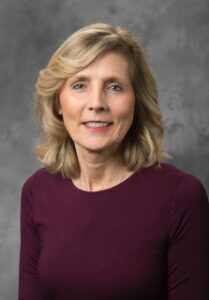 Vicki Simpson, PhD, associate professor of nursing at Purdue University, in collaboration with Lorra Archibald, executive director of the Healthy Communities of Clinton County Coalition, were recently awarded a five-year grant totaling $625,0000 to prevent and reduce youth substance abuse in Clinton County. The multi-year Drug-Free Communities (DFC) Support Program grant comes after building an eight-year relationship with the Healthy Communities of Clinton County Coalition, which has implemented multiple programs supporting the health and wellness of residents through Indiana Clinical and Translational Sciences Institute (CTSI) Community Health Partnerships (CHeP) Trailblazer awards and a CHeP planning grant award.
Vicki Simpson, PhD, associate professor of nursing at Purdue University, in collaboration with Lorra Archibald, executive director of the Healthy Communities of Clinton County Coalition, were recently awarded a five-year grant totaling $625,0000 to prevent and reduce youth substance abuse in Clinton County. The multi-year Drug-Free Communities (DFC) Support Program grant comes after building an eight-year relationship with the Healthy Communities of Clinton County Coalition, which has implemented multiple programs supporting the health and wellness of residents through Indiana Clinical and Translational Sciences Institute (CTSI) Community Health Partnerships (CHeP) Trailblazer awards and a CHeP planning grant award.
“The Indiana CTSI grants provided the support needed to develop an academic-community partnership,” Simpson said. “Because of this, we have been able to demonstrate the coalition’s success at enhancing the community’s health. There are many, many success stories that provide evidence of the impact.”
This collection of evidence includes three published manuscripts and six presentations resulting from Indiana CTSI-supported work, as well as the implementation of a community-based wellness program that provided screenings, health education, and referrals at multiple community sites.
Simpson was elected to the Indiana CTSI CHeP Advisory Board last month to bring her insights from an academic standpoint, as well as leverage her years of hands-on experience in Clinton County and with the Healthy Communities Coalition to identify and strengthen ties across Indiana communities and university partners, among other work the advisory board performs, like developing programs and examining their impact on Indiana communities.
The DFC grant will be used to build public awareness campaigns and community education programs to change youth beliefs and enhance parental knowledge around vaping and add partners to the coalition in support of further addressing substance use issues through implementing evidence-based programs in schools and local youth organizations. Funding will also be used for follow-up drug testing, adding vape detectors in schools, engaging teenagers in a Youth Leadership Council, mentoring programs for at-risk youth, and individual level interventions.
The grant application noted the Clinton County community has seen an increase in teen vaping of both nicotine and marijuana, which is having a negative impact at multiple levels, including school expulsions, legal citations for use among 18- to 21-year-olds, and increased probation cases for those under 18 years of age. It also cited a low perception of risk or harm from substance misuse.
“We need to change the increasing percentage of teen drug use,” Simpson said. “A big effort is required, and it’s easier tackled when we partner with coalitions like this in Clinton County.”
Studies show a higher than state average use of nicotine in Clinton County’s middle school students (21.4 percent) and high school sophomores (17.4 percent) and juniors (21.3 percent). Drastic increases have also been seen in marijuana use in the month prior to the grant submission among students from 9th to 11th grade, with nearly 35 percent of 10th graders saying they have favorable attitudes toward drug use.
The Drug-Free Communities Support Program grant is part of the Office of National Drug Control Policy that reaches an estimated 2.4 million middle school students and 3.4 million high school students across the country.
“Our hope is to ultimately support healthy social and emotional development of youth, which translates into healthy productive adults who have higher levels of education and employment, as well as physical and mental health,” said Simpson and Archibald. “We can achieve this by decreasing the initial use of nicotine and marijuana and lowering ongoing use of those same substances.”
Simpson added that this overall goal will be achieved by collaborating with community stakeholders to implement individual, school, and community-level interventions, decrease barriers, increase access to prevention, treatment, and recovery resources, and enhance community level knowledge of the growing issue.
“Population health needs can only be addressed if communities work together to exchange knowledge, share finite resources, and decrease service fragmentation for the populations they serve,” said Simpson. “Policies, systems, and environments must all be addressed. The Coalition already provides programming in all four school corporations and the alternative school. They are also affiliated with local youth-serving organizations. These collaborations have resulted in the completion of multiple projects to support youth wellness.”
